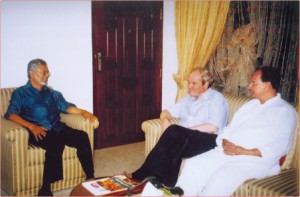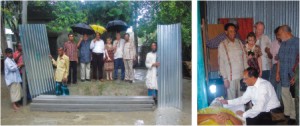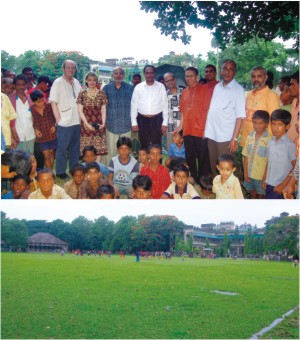Feature
Prof. Charles Choguill's sojourn to Bangladesh
Tanvir A. Khan
 |
Mr. Quamrul Islam Siddique, Prof. Charles L. Choguill and Dr Tanvir A Khan |
Professor-Emeritus Charles L. Choguill and his charming wife Dr. Marisa Choguill landed at the Zia International Airport on the morning of June 14, 2008.
Here is a personality who had joined the University of Sheffield, United Kingdom two weeks before Bangladesh became an independent country in 1971. From 1974, his stint at problem-solving in Bangladesh as a co-worker with Professor Jimmy James (former Chief Town Planner, UK) led him to take many challenges.
The BUET-Sheffield Joint degree program was their brain-child and it did successfully well in churning out thirty planners under the auspices of the United Nations Fellowship program. No less a person as Mr. Quamrul Islam Siddique (popularly known as the father of LGED), Dr. Tasleem Shakur, Dr. Abdul Mohit, Ms. Nilufer Matin, Mr. F. M. Aziz, Dr. Ahmeduzzaman, Ms. Laila Baque and a lot of other prodigies were his students. All of them are now in different places of the world contributing their acquired knowledge to the problems at home or abroad.
Prof. Choguill's last trip was 18 years ago when he visited the site at Mirpur to observe the latest progress. He visited Dhaka so that he could brush up his thesis with the current feedback and finally it was published as a book on Bhashantek at Mirpur captioned “New Communities for Urban squatters: Lessons from the Plan that failed in Dhaka, Bangladesh”. This time also in 2008 he visited the site at Mirpur to observe that his conclusions remain unchanged.
He honestly confesses that this book was not a best-seller by any stretch of the imagination, although it received incredibly good reviews. His intention was to highlight the planning problems that had occurred on this project. He noted that they were not unique to Bangladesh, or even just housing projects, but had occurred in many projects in other countries at other times.
In his convocation speech delivered on June 15, 2008 he shared few lessons to be learned from this development project to the graduating members of the Class of 2008 of Independent University, Bangladesh (IUB).
 |
At the home for the distressed project at Agtarail (left), and at the eye camp at Agtarail |
The first lesson he would argue is not to become dependent upon others when one is working in their chosen fields. For the Mirpur project, expatriates were recruited to plan something in a country where they had limited local knowledge. They proposed technology that was not really appropriate for the situation. He reminded the graduates that Bangladesh is their country and they know it better than any outsider.
The second lesson was to base one's work on a solid foundation. He advised the graduates not to rush into things without adequate knowledge. He emphasized to think, think and think again. At Mirpur, a major conclusion was that many of the things that went wrong could have been anticipated had the planners merely thought about them. He reminded the graduates that hours of forethought are better than days of regret when things start to go wrong.
The third lesson he shared with the graduates was not to be afraid to talk with their colleagues and friends about what they are doing as this is likely to reduce the probability of failure. His assessment was that the Mirpur project was based on top-down communications. There was no consultation.
 |
Prof. Choguill and his wife in front of BCRG Degree College, Pakutia (top) and Residential University of the future at Pakutia |
The fourth lesson he shared was not to give up. He advised that if things get difficult, revise and do it again. He opined that Mirpur seemed to have worked on the second try. The revised project was quite different from the original, yet it incorporated local knowledge and was successfully completed.
Finally, with his subtle sense of humour he stated that if the graduates decided to ignore all of this advise, and go ahead impulsively with the outsiders, inappropriate technology, skipping the logical steps that they know will reduce the chances that things will go wrong, then make certain that they are very, very tall, as that is the only way, once the dike breaks and the flood water rushes in, that they can keep their heads above the water.
A new chapter for Prof. Choguill is probably in the offing. He had not seen rural Bangladesh in the previous trips. This time around he was taken to a village named Agtarial in the Nagarpur Thana of Tangail as the Chief Guest in the inauguration of an 'Eye-camp' and 'Homes for the Destitute' held by the Rotary Club of Dhaka West, District 3280.
His student Quamrul Islam Siddique, the father of LGED ( who has recently passed away) organized constructing the local road in 1996 from Saturia to Pakutia, an 11 kms stretch on which he was travelling on that occasion and to this day this track has remained in one piece. The mentor Choguill felt proud that his protégé Quamrul had been involved in the highest seat of decision making and contributed enormously in the development of his country. There are so many local roads like this in Bangladesh which were constructed under Mr. Siddique's guidance and supervision.
Prof. Choguill and Dr. Marisa Choguill were delighted to observe the splendour of a degree college known as the Pakutia BCRG degree college in such a remote area. A 35 acre site could probably become a sprawling campus for a residential university, so they wondered. Why not? It is far from the madding crowd as it is 25 kms from the Dhaka-Aricha highway. It takes only one and a half hour to traverse 70 kms to reach Dhaka city (minus the traffic jam) from Pakutia and one hour to reach Tangail town on the other side.
Prof. Choguill is currently teaching as Professor of Urban Planning at the College of Architecture and Planning of King Saud.
(Writer is a Economist and is currently Registrar Independent University, Bangladesh)
| 